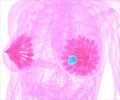China has decided to promote a package for breast cancer prevention and treatment standards across the country, to help prolong patients' survival and narrow the diagnosis and treatment gap.

‘The guidelines aimed at changing disease-centered diagnosis and treatment model into a patient-centered strategy that should help patients live longer with good quality of life.’





The NCC data, released in March 2018, showed the breast cancer mortality in China accounted for 16.5 per cent of all cancers in women. However, the cure rate has been improving steadily with the five-year survival rate reaching 83.2 per cent between 2010 and 2014, up 7.3 per cent since 2000. As survival time has been stretched, more patients have entered a chronic disease period, according to the guidelines for breast cancer follow-up and overall management of concomitant diseases, the first of its kind in China, by the NCC.
Common concomitant diseases of breast cancer, include cardiovascular diseases, abnormal bone metabolism and depression. "Among elder patients, cardiovascular diseases have caused even more deaths than cancer," said Ma Fei, Executive Chairman of the conference and NCC expert.
Under the dual effects of ovarian dysfunction and drugs, postmenopausal patients suffer a distinct drop in estrogen levels, which often causes an abnormal lipid amount in the blood and increases the risk of cardiovascular diseases, Ma said.
In addition, a large number of patients will continue to receive endocrine therapy for 5-10 years after cancer treatment, which is often accompanied by abnormal bone metabolism, osteoporosis and fractures.
Advertisement
According to Ma Fei, the guidelines is an important step to change the disease-centered diagnosis and treatment model into a patient-centered one. "The patients should not only live longer, but also live well," he said.
Advertisement
As for breast cancer, the five-year survival rate varies in different areas. The eastern coastal cities report a survival rate of 90 per cent, roughly the same level as in developed Western countries, while the inland and rural area rates are lower at 70-80 per cent.
Moreover, the incidence of breast cancer in China is still growing 3-4 per cent a year, which is higher than the global average.
"To improve the breast cancer cure rate, early diagnosis and treatment are important. At present, not more than 20 per cent breast cancer cases are detected at an early stage, and less than 5 per cent are found by screening," Ma said.
China started free breast cancer and cervical cancer screenings among rural women in 2009. But for selection of screening techniques, especially when targeting different age groups, there is no single standard. The lack of screening professionals has also resulted in high rates of false or missed diagnosis.
The NCC also released guidelines for screening, early diagnosis and treatment, which defines the screening targets and methods as well as early diagnosis and treatment paths.
European and American countries recommend mammography as the major screening method. But according to a research, more than half of patients in China worry about the procreation problem, very few ask to adjust their treatment plans.
The consensus suggests young patients should all receive genetic counselling regardless of their family history.
"The consensus fills in the gap in helping protect the reproductive health of cancer patients and provides practical operational instructions for medical institutions at all levels, marking a new step toward establishing an overall management system for breast cancer in China," Ma said.
Source-IANS















